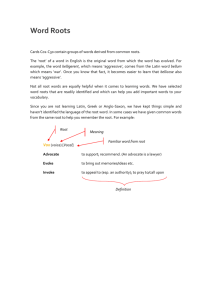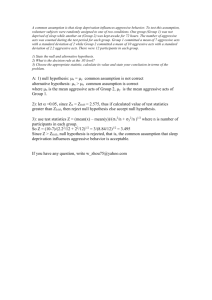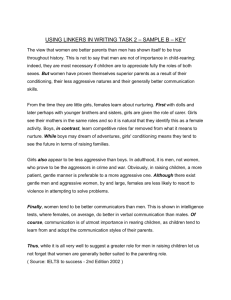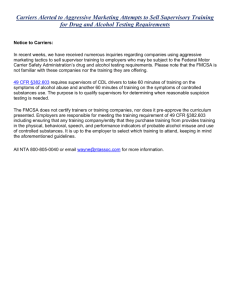Homework B due 14 September Aggressive accounting article
advertisement
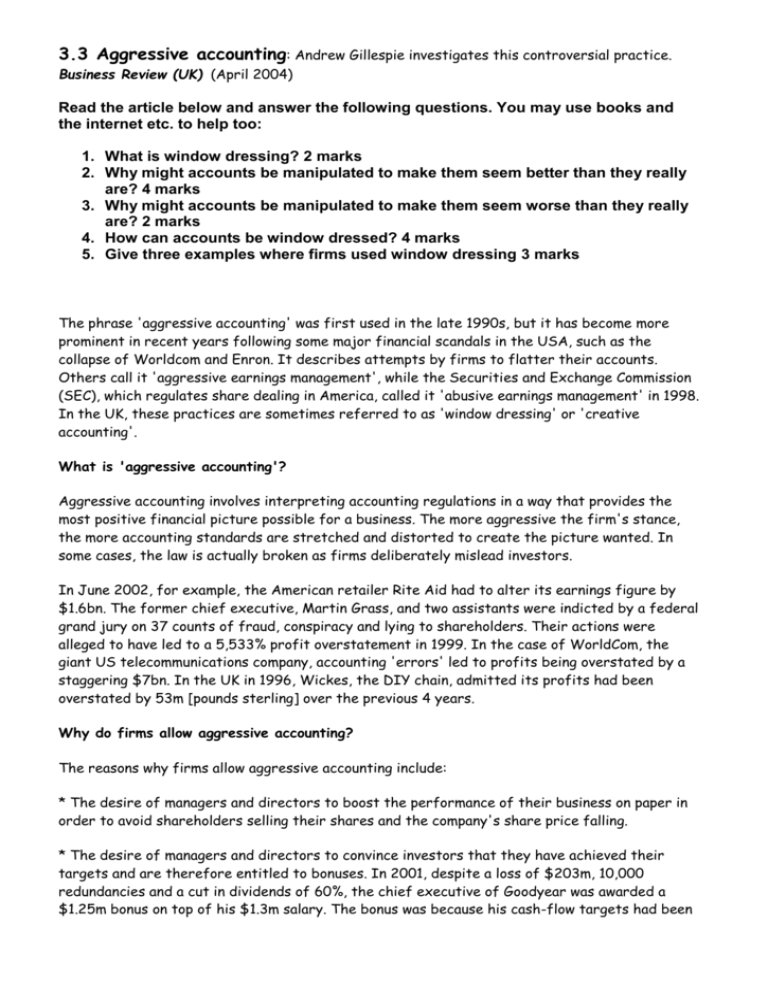
3.3 Aggressive accounting: Andrew Gillespie investigates this controversial practice. Business Review (UK) (April 2004) Read the article below and answer the following questions. You may use books and the internet etc. to help too: 1. What is window dressing? 2 marks 2. Why might accounts be manipulated to make them seem better than they really are? 4 marks 3. Why might accounts be manipulated to make them seem worse than they really are? 2 marks 4. How can accounts be window dressed? 4 marks 5. Give three examples where firms used window dressing 3 marks The phrase 'aggressive accounting' was first used in the late 1990s, but it has become more prominent in recent years following some major financial scandals in the USA, such as the collapse of Worldcom and Enron. It describes attempts by firms to flatter their accounts. Others call it 'aggressive earnings management', while the Securities and Exchange Commission (SEC), which regulates share dealing in America, called it 'abusive earnings management' in 1998. In the UK, these practices are sometimes referred to as 'window dressing' or 'creative accounting'. What is 'aggressive accounting'? Aggressive accounting involves interpreting accounting regulations in a way that provides the most positive financial picture possible for a business. The more aggressive the firm's stance, the more accounting standards are stretched and distorted to create the picture wanted. In some cases, the law is actually broken as firms deliberately mislead investors. In June 2002, for example, the American retailer Rite Aid had to alter its earnings figure by $1.6bn. The former chief executive, Martin Grass, and two assistants were indicted by a federal grand jury on 37 counts of fraud, conspiracy and lying to shareholders. Their actions were alleged to have led to a 5,533% profit overstatement in 1999. In the case of WorldCom, the giant US telecommunications company, accounting 'errors' led to profits being overstated by a staggering $7bn. In the UK in 1996, Wickes, the DIY chain, admitted its profits had been overstated by 53m [pounds sterling] over the previous 4 years. Why do firms allow aggressive accounting? The reasons why firms allow aggressive accounting include: * The desire of managers and directors to boost the performance of their business on paper in order to avoid shareholders selling their shares and the company's share price falling. * The desire of managers and directors to convince investors that they have achieved their targets and are therefore entitled to bonuses. In 2001, despite a loss of $203m, 10,000 redundancies and a cut in dividends of 60%, the chief executive of Goodyear was awarded a $1.25m bonus on top of his $1.3m salary. The bonus was because his cash-flow targets had been 3.3 Aggressive accounting: Andrew Gillespie investigates this controversial practice. Business Review (UK) (April 2004) achieved; some have claimed that aggressive accounting methods were used to boost cash flow. * The pressure from investors for steady profits growth. Investors tend to get jittery if profits go up a lot in one year and then down the next, then back up again. Managers may manipulate the figures to provide a consistent annual increase in profits. The pressure to use aggressive accounting policies is likely to be particularly high in public limited companies, where shares are being bought and sold daily and where it is essential to keep the share price high. If the price falls too low there is a danger of a takeover bid. The dramatic decline in share prices in the UK between 2000 and 2003 has no doubt put even more pressure on UK firms to turn in good performances. How can aggressive accounting occur? Many people believe that accounting is a science. They think there are a series of rules that can be applied consistently to all organizations. All accountants and auditors have to do is use these rules to produce the accounts. On this basis, whoever produced the accounts would end up with the same set of results. The reality is very different. Accountants have a basic set of principles and guidelines, but how these are interpreted can vary enormously. It is possible for two accountants to look at the same business and end up with radically different sets of accounts. A common joke in accounting is that accountants ask managers what figures they want to end up with before they start producing the accounts and then make sure they end up with these figures at the end of the process. Accounting can therefore be quite creative--accountants have the ability to look at a firm's situation and apply accounting standards in different ways. In the UK, company legislation does not require companies to comply with accounting standards-although under the 1985 Companies Act they do have to state whether their accounts have been prepared in accordance with applicable accounting standards and to give particulars of any significant departure from those standards and the reasons for it. Of course, the vast majority of firms have straightforward accounts drawn up in a prudent manner. The problem for anyone outside the business is that they cannot be 100% sure that prudence is being applied to the firm in question. Aggressive accounting techniques (1) Shipping too much stock to customers Companies may deliberately ship too much stock to customers (perhaps in return for major discounts). By shipping the goods before the accounts are produced the firm can count these as sold and include them as revenue in its accounts, even if it then brings the goods straight back after the accounts are produced. At the time of writing, there is an ongoing investigation into the pharmaceutical company Bristol-Myers Squibb by the SEC which has caused the company to reduce its sales figure for 1999 by $376m, the figure for 2000 by $678m and the figure for 2001 by $1.44bn. Regulators 3.3 Aggressive accounting: Andrew Gillespie investigates this controversial practice. Business Review (UK) (April 2004) are reviewing whether the company inflated revenues improperly by providing wholesalers with incentives to buy excessive amounts of its drugs. (2) Leasing an item to a company but counting several years of future revenue in this year's accounts For example, a firm might sign a contract to lease an item to a business for 10,000 [pounds sterling] a year for 5 years and then put 50,000 [pounds sterling] in this year's accounts as revenue, which would boost this year's profits. Similar arrangements have occurred with servicing contracts. For example, a firm signs a contract to service another firm's computers for 3 years for 20,000 [pounds sterling] a year and puts down 60,000 [pounds sterling] this year as revenue. Xerox was accused of such practices in the USA and, while not admitting that it had done anything wrong, agreed to pay $10m in fines to the SEC. It also went back and changed its accounts from 1997 onwards leading to a reduction in its published revenue of over $2bn. (3) Changing depreciation policies to reduce the annual cost of an asset and so boost this year's profits This can be done by extending the expected useful life of an asset so the costs are spread over more years. Estimating the life of an asset can be extremely difficult. How long will a new machine last? What about new fixtures and fittings? Firms may genuinely not know, and so extending the life span may be a proper attempt to reflect reality; on the other hand, it can be deliberate window dressing. (4) Estimating expected costs the firm could incur in the future For example, a firm might estimate the redundancy costs from a restructuring, lump together all these expected costs in one lump sum as a 'provision' and put them in this year's accounts. This reduces the year's profits (which may be fine if it was going to be a good year anyway). Later on, if the costs do not occur, the firm can put the figure that had been included as a provision back into the accounts as a profit. Some firms have been accused of deliberately exaggerating provisions in good years so they can bring them back later in bad years. The use of provisions was reported to happen a lot after 11 September 2001, when everyone was expecting bad results for companies. Firms deliberately put down huge numbers for provisions, knowing investors would not mind, given that many firms were producing poor results; they could then declare these as profits in later years. What is important to note is that these practices, or variations of them, are not uncommon, which is why it is essential to treat published accounts with caution. Terry Smith (who wrote the brilliant book Accounting for Growth, which revealed how extensive such practices were) advises potential investors to start reading financial reports from the back, to identify any changes in accounting practices. Even when companies are behaving legally it can be useful to examine the accounts carefully to see where the profits are coming from. In May 2003, for example, the Guardian claimed that nearly two-thirds of the reported pre-tax profits generated by Bhs Group, the holding company 3.3 Aggressive accounting: Andrew Gillespie investigates this controversial practice. Business Review (UK) (April 2004) for Philip Green's much-praised Bhs empire, consisted of accounting adjustments and profits on asset sales since the entrepreneur bought the retail chain from Storehouse 3 years ago. How to spot aggressive accounting Spotting aggressive accounting can be difficult, but some common warning signs are: * The retirement of the chief executive. Often he or she will want to finish with a strong financial performance (not least because the retirement package may be linked to this). The temptation will be to massage the figures. * An incoming new chief executive. There may be a very high level of expectation with investors looking for a dramatic turnaround. If this cannot be achieved through 'normal' methods, aggressive accounting may be the way out of difficulty. * A major restructuring. Those who brought it about will be keen to show it actually worked. What better way to do this than announce a significant boost in profits? * A change of auditors. Investors should be interested in why the last firm left and what makes the new firm so appealing--is it because it is more willing to let aggressive accounting occur? * Rumours and discontent among shareholders. Faced with complaints and possible replacement, the directors might want to improve the figures quickly. * The sudden resignation of the finance director. Why does he or she want to leave so suddenly? Why does aggressive accounting go unchecked? Aggressive accounting should be prevented by the auditors. They may insist that the figures are presented in a different way or only publish the accounts with a warning attached. However, if they do this, it might put their contract with the firm at risk. There is therefore pressure on the auditors to ignore aggressive accounting practices, provided they are legal, so that they continue to be hired by organizations to check their accounts. Blame must also lie with the managers and directors who allow, and even encourage, creative policies to be used. The fact that they get away with it, at least for a time, is because of poor corporate governance--a lack of sufficient effective checks on management behaviour. Investors end up being told what they want to hear but do not realise that they may be being misled. Does aggressive accounting matter? The deliberate manipulation of accounts to boost profit figures or asset values may mean that investors are being lied to. In the case of Enron and Worldcom, for example, investors had no idea that the supposedly impressive figures being reported were completely false. When the truth came out the companies which were supposedly worth billions went bankrupt and investors 3.3 Aggressive accounting: Andrew Gillespie investigates this controversial practice. Business Review (UK) (April 2004) lost their money. Financial scandals make investors generally wary of firms' figures and less willing to put money into businesses. This can make it more difficult for companies to raise finance and expand. Aggressive accounting therefore has huge implications, not just for those involved, but for business in general. The problem is knowing how to prevent it. Whatever rules you develop for accounting, someone, somewhere is likely to find a way around them, and in some cases the way to record a transaction is genuinely unclear.
